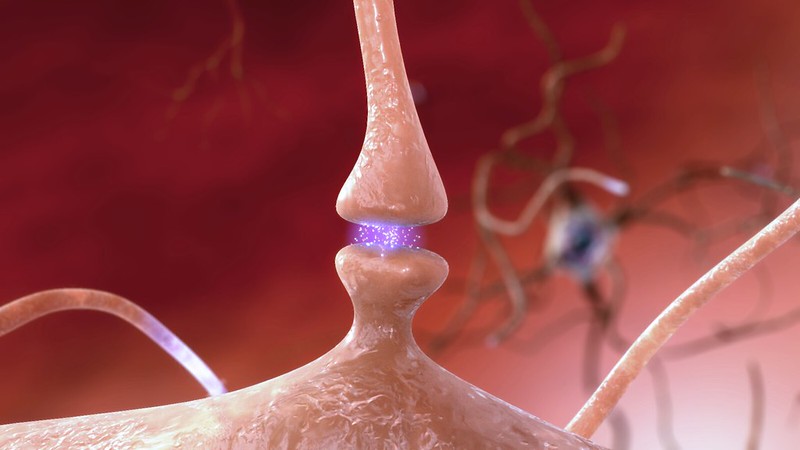
A synaptic receptor involved in the emergence of aberrant beliefs
Why are we sometimes inclined to believe in the improbable against all odds? A study conducted by a team of neuroscientists and psychiatrists from Hôpital Sainte-Anne and Université de Paris, as well as from the École Normale Supérieure - PSL and Inserm points to a specific synaptic receptor. Its blockage induces premature and aberrant decisions, as well as symptoms resembling those reported in the early stages of psychosis. The results have just been published in Nature Communications.

When the world around us becomes unpredictable and uncertain, we become more prone to believe in unlikely events - such as conspiracy theories during a pandemic. This type of reaction to uncertainty is particularly pronounced in early stages of psychosis: a general sense of strangeness often precedes the emergence of delusional beliefs. These early stages of psychosis are difficult to study, because patients typically seek medical assistance when delusional beliefs are already established.
The team, led by Valentin Wyart, Inserm research director at the Laboratoire de Neurosciences Cognitives et Computationnelles (Inserm/ENS-PSL) and Pr. Raphaël Gaillard of Université de Paris at Hôpital Sainte-Anne-GHU Paris, studied the role of a specific synaptic receptor called NMDA (N-methyl-D-aspartate) in the emergence of these aberrant beliefs. In the brain, synaptic receptors regulate communication at synapses, the points of contact between neurons. The researchers did not happen to study this receptor by chance. Indeed, a rare form of encephalitis caused by an autoimmune reaction against the NMDA receptor is known to give rise to psychotic symptoms.
To understand whether a dysfunction of this receptor favours the emergence of aberrant beliefs, the team asked a group of healthy volunteers to make decisions based on uncertain visual information while being administered a very low dose of ketamine, a molecule that temporarily blocks NMDA receptors in the brain. Comparing the effects of ketamine on the behaviour and brain activity of the volunteers tested with those of a placebo, the researchers observed that the administration of ketamine produced not only an increased sense of uncertainty, but also premature decisions.
"A blockade of the NMDA receptor destabilises decision-making by favouring information that confirms our opinions and discarding information that invalidates them," explains Valentin Wyart. "This reasoning bias produces premature and often inaccurate decisions. It is the same type of bias that creates information bubbles on social media, by offering users a biased selection of information based on their existing opinions."
The team went further by showing that this reasoning bias compensates for the increased sense of uncertainty experienced under ketamine. "This result suggests that the premature decisions we observe are not driven by overconfidence," continues Valentin Wyart. "On the contrary, these decisions seem to be the result of high uncertainty. They trigger the emergence of ideas that are highly improbable, but nevertheless self-reinforcing by ignoring the information that could invalidate them."
These results open up new avenues for clinical investigations of possible treatments for patients suffering from psychosis. "Existing treatments act on the delusions themselves, but do little to influence what causes them," explains Pr. Raphaël Gaillard. "Clinical trials should therefore be carried out to determine how to increase patients' tolerance to uncertainty in the early stages of psychosis."
Alexandre Salvador, Luc H. Arnal, Fabien Vinckier, Philippe Domenech, Raphaël Gaillard and Valentin Wyart (2022). Premature commitment to uncertain decisions during human NMDA receptor hypofunction. Nature Communications, 13, 338, DOI: 10.1038/s41467-021-27876-3
Contact researcher: Valentin Wyart (valentin.wyart@inserm.fr)
Press release



